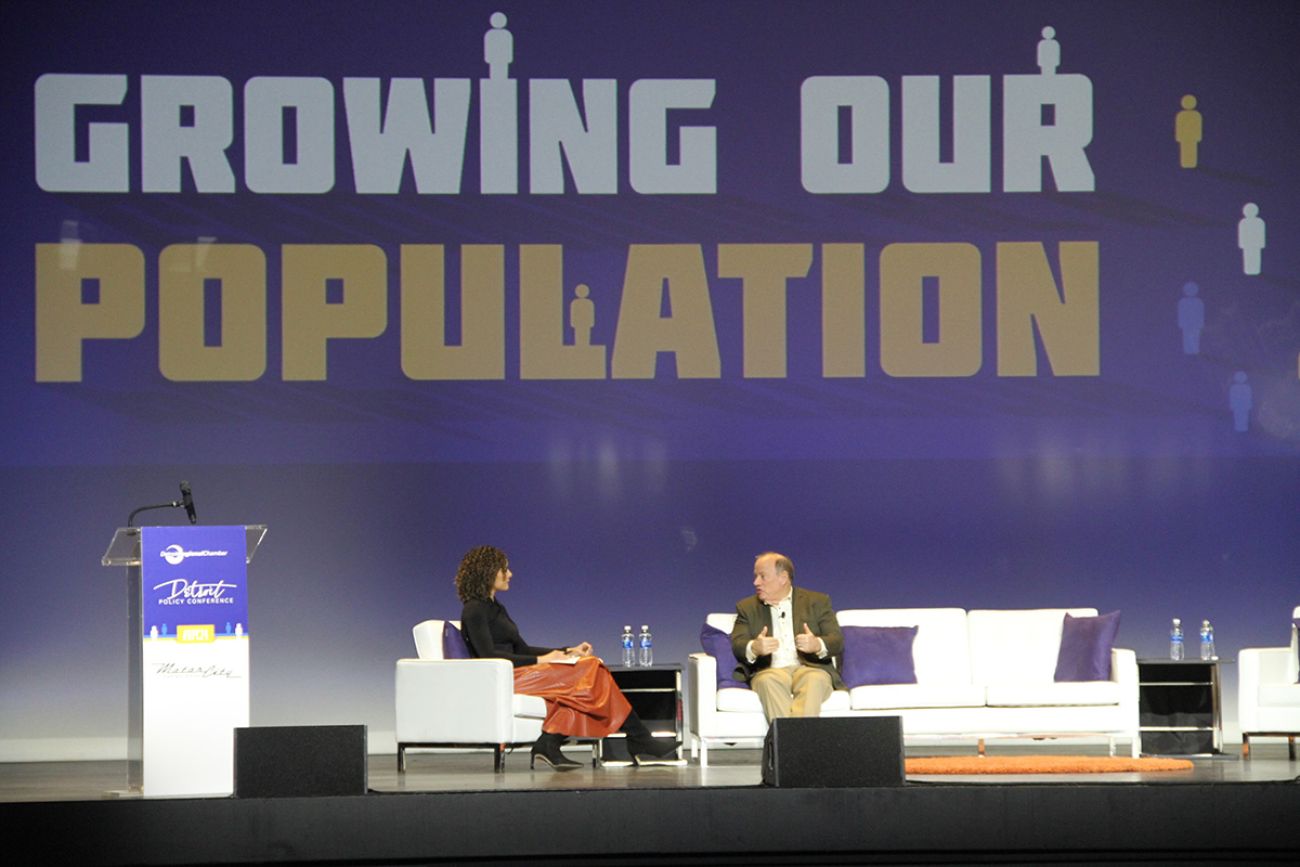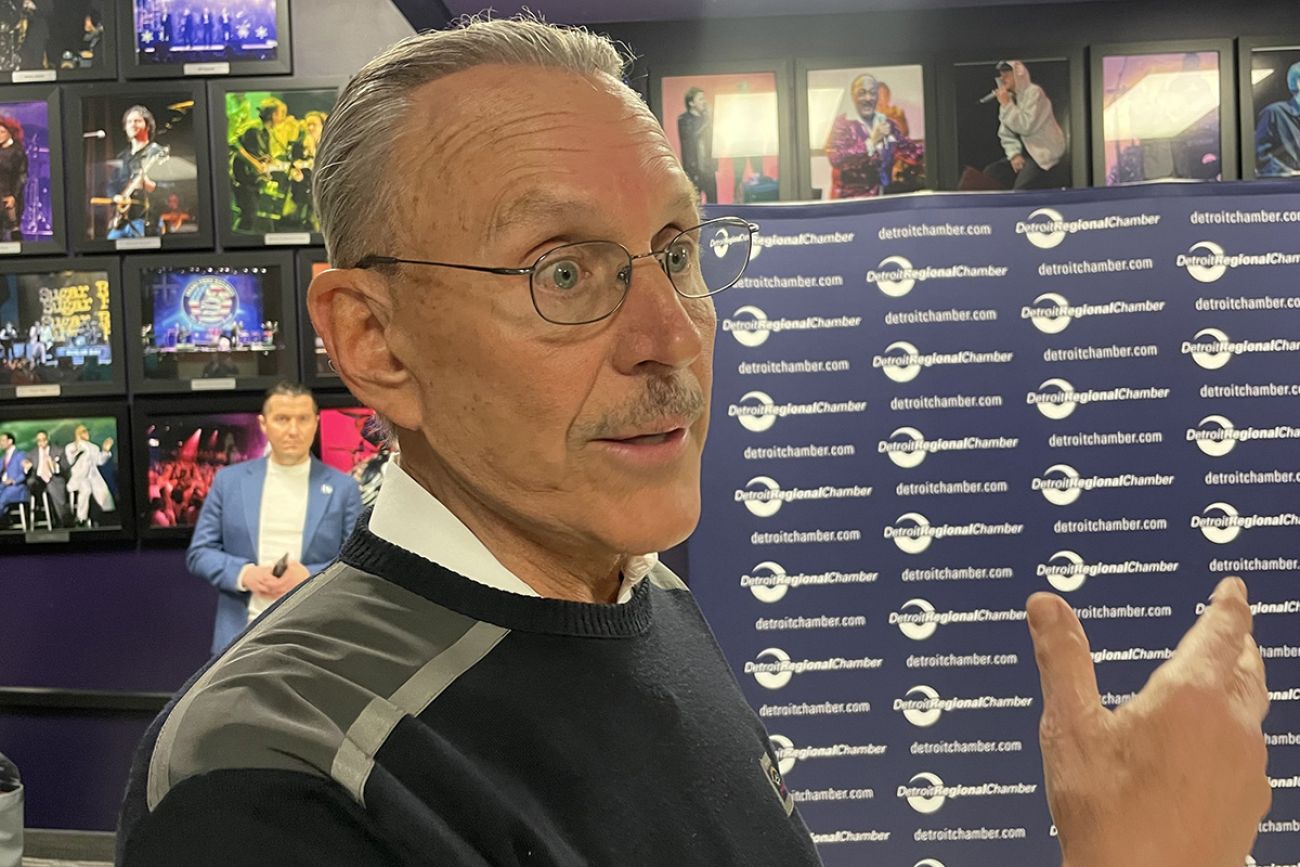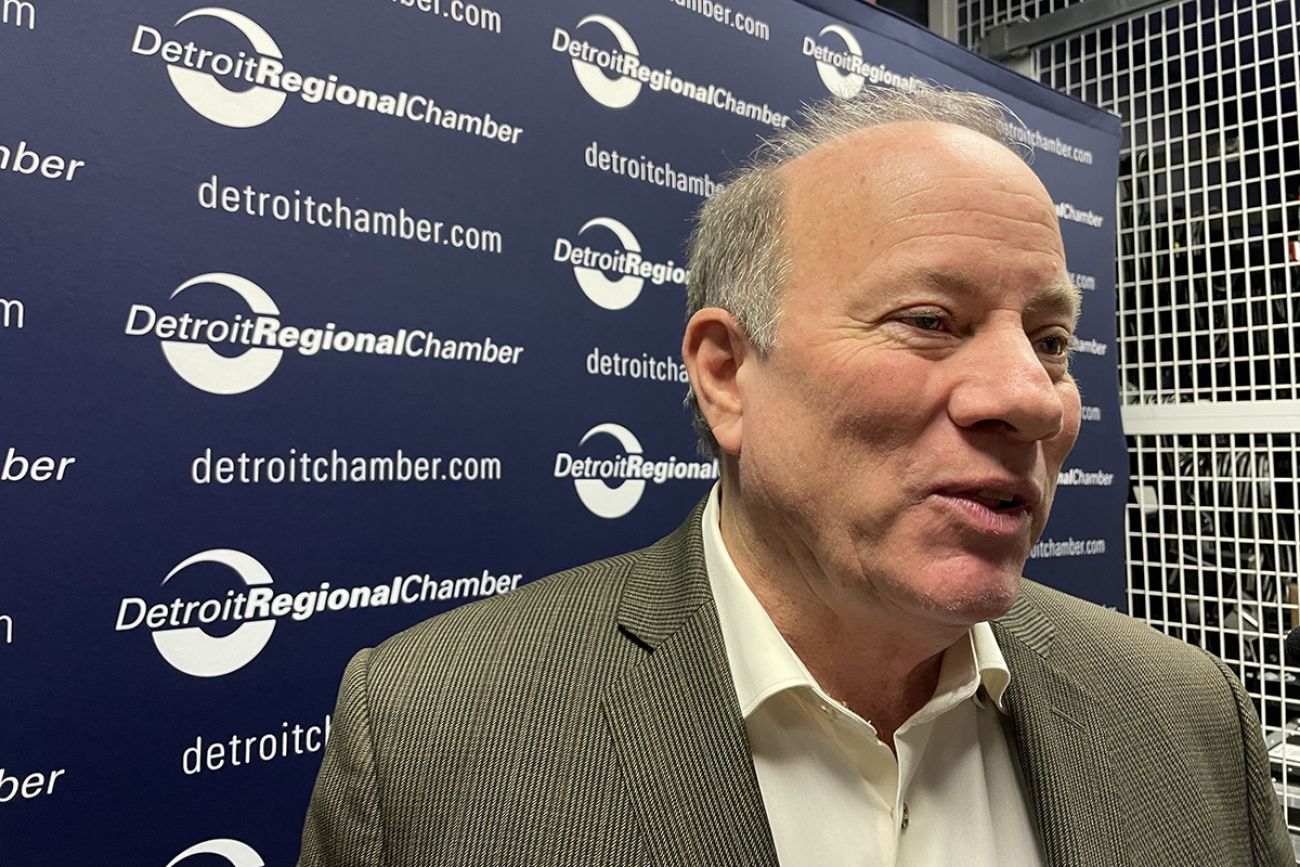Michigan’s population crisis dominates Detroit Policy Conference

Michigan elites agree that a lack of quality education, public transportation and attractive cities is creating a population crisis for the state, but there’s less consensus on a plan of action.
Growing Michigan’s population was the overarching theme of Thursday’s annual Detroit Policy Conference, which opened with a stark warning from Detroit Regional Chamber Chief Executive Officer Sandy Baruah.
A report published in December by a governor-appointed growth council shows the state is rapidly bleeding young college graduates, faces a declining birth rate, lower household income and a shrinking tax base. Michigan’s population isn’t just getting smaller, residents are becoming poorer, Baruah said. If left unchecked, the state’s future is dim.
“I’m here to make the case that Michigan’s house is on fire,” Baruah said.
Growing Michigan Together Council Co-Chair John Rakolta Jr. provided a sobering perspective on the possibility of reversing the shrinking population. The group’s recommendations, Rakolta said, probably won’t produce population gains in the next 25 years, despite their stated goal of becoming a top 10 state by 2050. Michigan would be lucky to stay the same size by then, he said.
Related:
- Michigan workforce quietly passes pre-pandemic levels, shows resilience
- Whitmer launches new education office, seeking more college grads in Michigan
- Michigan’s draft population plan: Better schools, high-tech jobs, new taxes
“The report says that for the next 25 years we’re going to struggle,” Rakolta said. “Adding 10,000 to 15,000 people isn’t the issue here. We need to add 2.5 million people. Prosperity is a requirement for population growth. Let’s focus on prosperity and productivity and let’s not concentrate on population growth.”

The growth council’s report establishes a set of facts that can’t be ignored, said Chief Growth Officer Hilary Doe. Attendees of Thursday’s conference told BridgeDetroit these forces have been decades in the making, necessitating a wake up call for leaders of government, business, civic organizations and educational institutions.
“The people of Michigan need to take this task up together,” Doe said. “We have a shot, because there is a lot of buy-in from the business community, our nonprofit partners, individual Michiganders, and the Legislature seems excited about partnering on these ideas.”
Rakolta said the report is also a call for accountability. It’s up to Gov. Gretchen Whitmer to take action on policy recommendations that the 28-member group proposed in December, Rakolta said. He called on the governor to identify wasteful spending in the state budget and use it to fund prosperity initiatives.
“I’m sitting on my hands right now wondering what’s next,” Rakolta told reporters Thursday. “We have promoted ourselves to wanting to be a top 10 state for 15 years now – we’re no closer today than we were 15 years ago. Does our approach have to become more radical than it’s been in the past to get the kind of results that we’re looking for?”
The report makes the case for three main strategies focused on improving K-14 education and career training, building regional transportation networks and improving amenities in urban spaces that will attract young talent while convincing existing residents to see their future in Michigan.
Detroit is key to population strategy
Detroit is Michigan’s largest city but has experienced a steep population decline since 1950. Population council members say improving opportunities for residents who have stayed while marketing the state as an attractive destination is an important piece of the overall strategy.
“There are communities that we know are poised for growth,” said Doe, who lives on Detroit’s east side. “People want to stay in Detroit, people want to join us here. We have big opportunities here, we have a right to lead high growth industries, and future mobility. We have a burgeoning tech sector with diverse founders that are solving some of the big challenges of our time.”
Anika Goss, a voting member of the population commission and Detroit Future City chief executive officer, said prosperity must be equitable. Black Detroiters are lagging behind other racial groups in homeownership, wages and college degrees. The data is unacceptable, she said.
“If these are the conditions of Black people in the largest city in Michigan, what does this say about our ability to attract and retain a diverse, equitable and resilient population across the state,” Goss said. “We’re all in positions of power, influence. It is up to us to make sure these statistics are not the standard.”
Mayor Mike Duggan, who has led the city for a decade, said he’s been at the helm of a plan to grow the population in Detroit. Duggan said he’s focused on creating a base of good-paying manufacturing jobs while building an environment for emerging tech industries.
“The Detroit of the 60s, 70s and 80s was a Detroit where people were very proud of Black homeownership and the creation of Black wealth,” Duggan said. “We need to get there again and I think we’re headed in the right way.”

Duggan pointed to new investments from the University of Michigan, which is building a graduate campus in downtown Detroit, and Michigan State University, which is partnering with Henry Ford Health to build a medical research campus in New Center.
The mayor said he’s not waiting for the state to dole out resources to address population growth. Detroit’s own plan is going “just fine,” Duggan said.
He continues to challenge the U.S. Census Bureau estimates that show population losses. Duggan said the census has failed to accurately account for population growth, and expects estimates from 2020, 2021 and 2022 will be revised.
“I think we are convincing the Census Bureau that there was some real bias in the annual estimate formulas and I’m optimistic they’re gonna fix it,” Duggan said. “You can’t treat the demolition of vacant houses as population reduction.”
Doe said the state lacks affordable housing, and she’s working with the Michigan State Housing Development Authority on new assistance programs for residents who might pay less for a monthly mortgage than rent but can’t save up for a down payment.
Detroit launched a federally-funded downpayment assistance program that has seen early success, but city officials said some applicants struggled to find a home that doesn’t have significant repair needs.
Detroit City Council President Mary Sheffield said creating affordable housing is a major priority for the city. She represents a district that includes a portion of downtown and less wealthy neighborhoods on the city’s east side. Sheffield said it’s important to develop the downtown while also setting aside new housing units for lower income residents.
Sheffield highlighted a 2023 University of Michigan study that found only a third of breadwinners in Detroit households (36%) and less than half of full-time workers (49%) are earning a living wage.
“It’s not just about jobs, it’s about the quality of jobs, are they sustainable and are they the type of jobs where people will want to live here, raise a family and raise themselves up the economic ladder,” Sheffield said.
Young people want public transit
A recognition that young people prefer to live in walkable cities that provide transit options that don’t require owning a car was a theme of Thursday’s conference.
Population council co-chair and Wayne State University board member Shirley Stancato said she was surprised to learn young people prefer not to drive. Aidan Sova, an Ann Arbor Library trustee and one of few young voices on the population council, said there’s a clear financial reason – owning a car, paying for insurance and maintenance are expensive. Young people would rather put that money toward a home, he said.
Tiffany Gunter is deputy manager and chief operating officer of the Suburban Mobility Authority for Regional Transportation (SMART). Across her two-decade career, Gunter said state officials have never been more focused on improving regional transportation networks between Detroit and suburban communities.
“You don’t have to convince leadership that this is necessary any longer,” Gunter said.
Bernard Parker III, vice president of external affairs for SMART, said the shift in perspective is largely driven by a new generation of young elected leaders who understand the issue better than their older counterparts. Parker said SMART’s challenge is to deliver better, more reliable service.
The Regional Transit Authority asked voters in Wayne, Washtenaw, Oakland and Macomb counties to fund a bus rapid transit system with a new tax. The 2016 millage proposal was defeated with a majority of voters in Oakland and Macomb counties rejecting it.
Oakland County voters approved another millage proposal in 2022 that funds transportation services provided by SMART. Coulter said ridership is up 20% in the last year. He’s optimistic that Macomb County leaders are more open to joining the regional transit system.
“We need to get our act together as a region” to seek federal funding for public transit, Coulter said.
Gunter said she’s seen public opinion changing as SMART has improved service.
“If you provide people with something they find useful then the question of funding, (becomes easier),” she said.
Detroit is testing a dedicated lane for bus rapid transit on Jefferson Avenue this year. Duggan said that means buses will run faster between stops and have paperless ticketing.
Duggan said he’s also exploring modifying Detroit People Mover routes, which runs in a closed loop around downtown but was originally envisioned as a larger network that would go into the city’s neighborhoods and connect to a suburban subway that was never built. Duggan said a reconfiguration could help better connect the downtown for residents who “live, work and play” there.
“What we’re trying to think about when it comes to long-term transit is where do I need investment in a fixed system and where are people going to want to go that isn’t in a straight line,” Duggan said.
Many officials at Thursday’s conference noted that people ultimately move where the opportunity is. Rakolta said there’s hope, if state leaders can shepherd smart investments and embrace Michigan’s strengths.
“All is not lost. Michigan has the ingredients – the smarts, the people, the desire – to solve this problem,” Rakolta said. “All we have to do is bring a level of urgency to it. We are continuing to push everyone in the state, every power center beyond Lansing to make a difference and force things to happen.”
See what new members are saying about why they donated to Bridge Michigan:
- “In order for this information to be accurate and unbiased it must be underwritten by its readers, not by special interests.” - Larry S.
- “Not many other media sources report on the topics Bridge does.” - Susan B.
- “Your journalism is outstanding and rare these days.” - Mark S.
If you want to ensure the future of nonpartisan, nonprofit Michigan journalism, please become a member today. You, too, will be asked why you donated and maybe we'll feature your quote next time!




